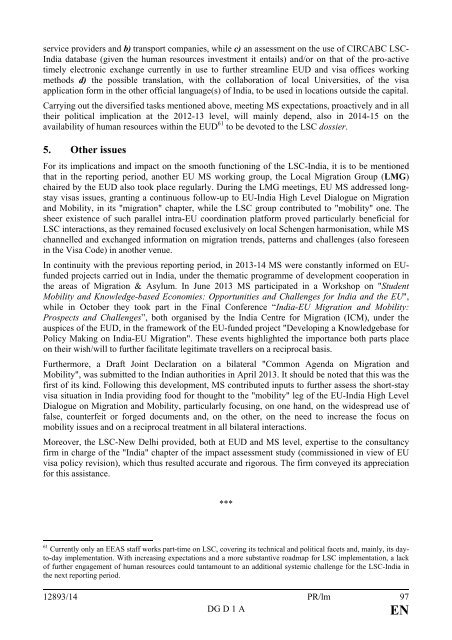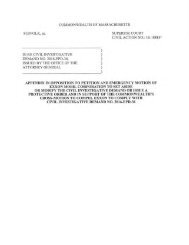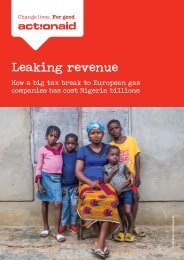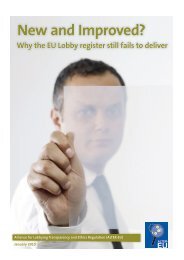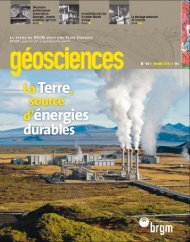eu-com-schengen-coop
eu-com-schengen-coop
eu-com-schengen-coop
Create successful ePaper yourself
Turn your PDF publications into a flip-book with our unique Google optimized e-Paper software.
service providers and b) transport <strong>com</strong>panies, while c) an assessment on the use of CIRCABC LSC-<br />
India database (given the human resources investment it entails) and/or on that of the pro-active<br />
timely electronic exchange currently in use to further streamline EUD and visa offices working<br />
methods d) the possible translation, with the collaboration of local Universities, of the visa<br />
application form in the other official language(s) of India, to be used in locations outside the capital.<br />
Carrying out the diversified tasks mentioned above, meeting MS expectations, proactively and in all<br />
their political implication at the 2012-13 level, will mainly depend, also in 2014-15 on the<br />
availability of human resources within the EUD 61 to be devoted to the LSC dossier.<br />
5. Other issues<br />
For its implications and impact on the smooth functioning of the LSC-India, it is to be mentioned<br />
that in the reporting period, another EU MS working group, the Local Migration Group (LMG)<br />
chaired by the EUD also took place regularly. During the LMG meetings, EU MS addressed longstay<br />
visas issues, granting a continuous follow-up to EU-India High Level Dialogue on Migration<br />
and Mobility, in its "migration" chapter, while the LSC group contributed to "mobility" one. The<br />
sheer existence of such parallel intra-EU coordination platform proved particularly beneficial for<br />
LSC interactions, as they remained focused exclusively on local Schengen harmonisation, while MS<br />
channelled and exchanged information on migration trends, patterns and challenges (also foreseen<br />
in the Visa Code) in another venue.<br />
In continuity with the previous reporting period, in 2013-14 MS were constantly informed on EUfunded<br />
projects carried out in India, under the thematic programme of development <strong>coop</strong>eration in<br />
the areas of Migration & Asylum. In June 2013 MS participated in a Workshop on "Student<br />
Mobility and Knowledge-based Economies: Opportunities and Challenges for India and the EU",<br />
while in October they took part in the Final Conference “India-EU Migration and Mobility:<br />
Prospects and Challenges”, both organised by the India Centre for Migration (ICM), under the<br />
auspices of the EUD, in the framework of the EU-funded project "Developing a Knowledgebase for<br />
Policy Making on India-EU Migration". These events highlighted the importance both parts place<br />
on their wish/will to further facilitate legitimate travellers on a reciprocal basis.<br />
Furthermore, a Draft Joint Declaration on a bilateral "Common Agenda on Migration and<br />
Mobility", was submitted to the Indian authorities in April 2013. It should be noted that this was the<br />
first of its kind. Following this development, MS contributed inputs to further assess the short-stay<br />
visa situation in India providing food for thought to the "mobility" leg of the EU-India High Level<br />
Dialogue on Migration and Mobility, particularly focusing, on one hand, on the widespread use of<br />
false, counterfeit or forged documents and, on the other, on the need to increase the focus on<br />
mobility issues and on a reciprocal treatment in all bilateral interactions.<br />
Moreover, the LSC-New Delhi provided, both at EUD and MS level, expertise to the consultancy<br />
firm in charge of the "India" chapter of the impact assessment study (<strong>com</strong>missioned in view of EU<br />
visa policy revision), which thus resulted accurate and rigorous. The firm conveyed its appreciation<br />
for this assistance.<br />
***<br />
61 Currently only an EEAS staff works part-time on LSC, covering its technical and political facets and, mainly, its dayto-day<br />
implementation. With increasing expectations and a more substantive roadmap for LSC implementation, a lack<br />
of further engagement of human resources could tantamount to an additional systemic challenge for the LSC-India in<br />
the next reporting period.<br />
12893/14 PR/lm 97<br />
DG D 1 A<br />
EN


